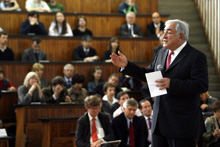
Typical street scene in Santa Ana, El Salvador. (Photo: iStock)
IMF Survey: Crisis is Opportunity for Deeper, Faster Integration
March 29, 2010
- Clear benefits of European integration
- Crisis exposed weaknesses in institutional framework
- Europe needs to look outward
A TV panel debate, set at the Royal Castle in Warsaw, saw a lively discussion about Europe’s past and future. Better coordination of economic policy would strengthen Europe’s common currency, the IMF chief said.

Dominique Strauss-Kahn in Warsaw: the IMF chief called for better coordination of European economic policy.
EUROPEAN ECONOMIES
“When you build a single currency, the natural step that follows should be a coordinated economic policy. Beyond monetary policy, Europeans must give themselves the means to manage economic policy,” Strauss-Kahn told his audience.
The debate, titled “Twenty years of Transformation in Central and Eastern Europe: Fulfilling the European Promise,” featured IMF Managing Director Dominique Strauss-Kahn, former Latvian President Vaira Vike-Freiberga, editor-in-chief of Gazeta Wyborcza Adam Michnik, and Jacques Rupnik, a historian. It will be broadcast by France 24 on April 6.
Current crisis represents opportunity for Europe
All four panelists pointed to the achievements of Europe since the single currency was introduced in 1999. But they also agreed the crisis has exposed weaknesses in the policy framework. Now is the time to address such weaknesses and to further strengthen economic governance in the eurozone, which includes the 16 members of the European Union that share Europe’s common currency, the euro.
The panelists were generally optimistic that Europe would emerge stronger from the current crisis. “There is no reason why the European Union would not be able to overcome this crisis, Strauss-Kahn said. “When I hear views from outside Europe, people say they are amazed at the incredible achievements of Europe, yet they are surprised that sometimes easy things cannot seem to be completed.”
“European integration is the best idea Europe has had in 2000 years. We must do what it takes to pursue the purpose,” Michnik said. Vike-Freiberga agreed. “Europeans have been complacent. Eurozone countries have been complacent. If we had followed up on the Lisbon strategy, we would be ahead of the game.”
“The crisis shows when the weather is quiet, existing institutions work well enough,” Strauss-Kahn added. “But when you have a storm, then weaknesses of this institution appear clearly. And better coordination and stronger coordination in economic policy in my view is absolutely needed.”
Playing by the rules
Belonging to the European Union and the eurozone has brought tremendous benefits to member countries. But these advantages also come with commensurate responsibilities. Panelists offered their take on the lessons they draw from the crisis and how to devise credible mechanisms for economic coordination.
The crisis is the eurozone’s own making because “some countries are not following the rules they set for themselves and for new entrants,” Vike-Freiberga said. It was now imperative that these countries put their own house in order, she said.
Strauss-Kahn said that the Stability and Growth Pact is part of the answer, but its rules must be better enforced. Better region-wide surveillance is also key. “The Stability and Growth Pact is only about fiscal rules. Europeans should also think in terms of shared research and development and innovation policies. Implementation of the Lisbon agenda cannot be left to the individual good will of countries,” he said.
Panelists concurred that implementation is key, and there should be no double standards for different sets of countries. Vike-Freiberga called on the eurozone countries to be faithful to their commitments to the EU members in emerging Europe.
Europe and the world
Strauss-Kahn stressed that it is essential that Europeans not be too inward-looking. “India, China, the United States and other parts of the world are growing fast. If Europe is to retain its place in the global economy, it too needs to move fast,” he said.
He urged policymakers to use the crisis as an opportunity to move ahead with deeper and faster integration. He and other panelists agreed the challenge is more political than technical. “20 years from now, when Europeans look back at the present period, will they see a missed opportunity? Not to be too emphatic, but what is at stake in the current debates is simply the future of Europe,” he said.
Greek crisis
In response to a question about Greece, Strauss-Kahn said that the IMF stands ready to help if asked to do so by the government. The IMF is not looking to be asked, he said, adding that he hoped that the Greek government will be able to manage without assistance from the IMF.
Rupnik said that even though the Greek crisis had dealt a serious blow to Europe’s image, a more long-term view would help put the crisis into perspective. “You can never take integration for granted,” he said. “It is not a linear process.” The current developments provided an opportunity for Europeans to spur political trust, transparency, and commitment, he said.
Strauss-Kahn and the other panelists were asked a number of questions from the audience. Themes ranged from the costs of addressing the demographic shock and ageing in Europe―was there a “hidden debt” facing the continent?―to whether Europe should rely more on market discipline in the future and less on the Maastricht Treaty. What specific measures were needed to strengthen economic coordination in Europe? Should more powers be transferred to the Commission, for instance in the areas of competition and deregulation?
The panel debate will be aired on April 6 by France’s TV24 broadcast network. It will also be available on imf.org.


